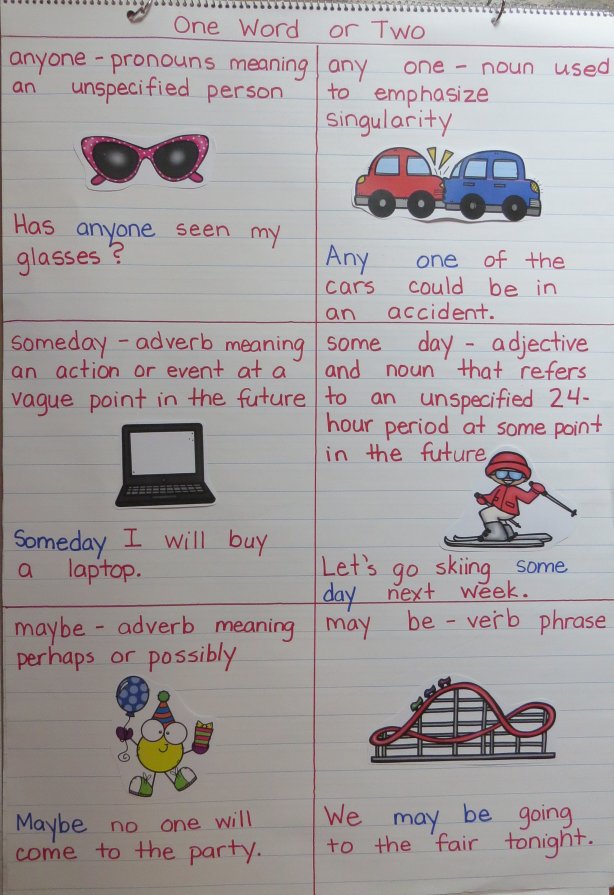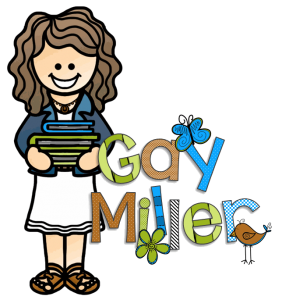Have you ever wondered if you should write apart or a part? How about anyone or anyone? English contains so many confusing words. Often, students wonder if they should use one word or two. These activities provide practice with six confusing word pairs using Google Apps.

Begin by having students type the definitions for each of the twelve words. Next, have students type an example sentence using the words. These Google Slides include charts for completing this assignment. The answer key may be used as a completed example for students to follow or for students who were absent during instruction.
Get the handout for this post here. This link takes you to the Google Slides practice slides. On one slide you will find the links to the Google Forms practice exercises.

Two versions of the quizzes are provided. Students can complete the practice using Google Slides. If you prefer, the same quizzes are provided through Google Forms. These self-grading quizzes provide immediate feedback for the students. Six ten-question quizzes are included so that practice may be divided into small mini-lessons.
- Apart vs A Part
- Everyone vs Every One
- Altogether vs All Together
- Anyone vs. Any One
- Someday or Some Day
- Maybe vs. May be
If you want to check these Google Forms out later, you can get the links in the pdf handout.
One Word or Two
Apart vs. A Part
apart – adverb meaning separated by distance or besides paired with from
We are living apart from one another.
a part – noun phrase meaning a piece of something – paired with of
I want a part of your pizza.
Everyone vs Every One
everyone – all the people in a group – substitute “everybody”
Is everyone going to the carnival?
every one – each individual – substitute “each”
Every one of the flowers is blooming.
Altogether vs All Together
altogether – completely, totally
This work is altogether too difficult.
all together – an entire group – meaning “all here”
Our family will be all together this Christmas.
Anyone vs. Any One
anyone – pronoun meaning an unspecified person
Has anyone seen my glasses?
any one – noun used to emphasize singularity
Any one of the cars could be in an accident.
Someday vs. Some Day
someday – adverb meaning an action or event at a vague point in the future
I will buy a laptop someday.
some day – adjective and noun that refers to an unspecified 24-hour period or at some point in the future
Let’s go skiing some day next week.
Maybe vs May Be
maybe – adverb meaning perhaps or possibly
I’m having a party; maybe no one will come.
may be – verb phrase
We may be going to the fair tonight.


One Word or Two Tips
- Adjectives coming before nouns are usually one word or hyphenated.
- Words that makeup verb phrases are usually two words.
- Words that are used as nouns may be one or two words. Look up words used as nouns in a dictionary.
One Word or Two Word List
Have your students enjoyed learning the differences in these confusing word pairs? Here’s a list to keep you busy for a while.
always vs. all ways
anytime vs. any time
backup vs. back up
backyard vs. back yard
bedpost vs. bed post
breakdown vs. break down
checkout vs. check out
checkup vs. check up
childcare vs. child care
cleanup vs. clean up
everyday vs. every day
healthcare vs. health care
layout vs. lay out
leftover vs. left over
lifetime vs. life time
makeup vs. make up
oftentimes vs. often times
overnight vs. over night
overtime vs. over time
pickup vs. pick up
setup vs. set up
something vs. some thing
sometimes vs. some times
standalone vs. stand alone
underway vs. under way



